How to Handle Increased Summer Water Demand
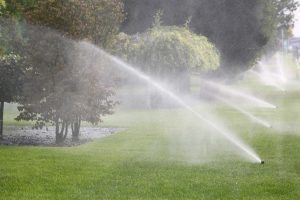 The summer months often go hand in hand with increased water demand and decreased supply. An influx of tourists combined with summer drought and increased outdoor water usage often leaves water systems feeling the pinch. Traditionally, water conservation has been limited to water use restrictions. However, increasing water efficiency is another way to address limited water supplies, with the added boon of providing economic and environmental benefit.
The summer months often go hand in hand with increased water demand and decreased supply. An influx of tourists combined with summer drought and increased outdoor water usage often leaves water systems feeling the pinch. Traditionally, water conservation has been limited to water use restrictions. However, increasing water efficiency is another way to address limited water supplies, with the added boon of providing economic and environmental benefit.
Efficiency = Conservation
Water efficiency reduces water usage that is unnecessary or wasteful. Rather than focusing on limiting the minutes per day a homeowner can water his lawn, efficiency focuses on accomplishing water objectives by utilizing only as much water as is needed. For example, we now know that flushing a toilet is just as effective with a 1.6 gallon flush as it is with a 3.5-7 gallon flush. Further, we know that water that drips out of a leaky faucet can waste up to 20 gallons per day, and that leaking municipal pipes waste exponentially more water. Increasing efficiency and reducing waste are two major ways in which we can all help to conserve water.
Municipal Efficiency
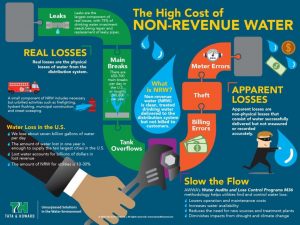 Considering that 10-30% of our nation’s clean, treated drinking water, or seven billion gallons per day, is “lost” before it ever even reaches the consumer, municipal efficiency is best accomplished by conducting routine water audits. Water audits help to identify the causes of water loss and develop strategies to reduce this loss — and recapture lost revenue. Most utilities in the U.S. conduct infrequent water audits and are likely suffering substantial losses without even knowing it. Repairing our nation’s hidden underground infrastructure will also increase water availability, lower operation and maintenance costs, reduce the need for new sources and costly treatment plants, and diminish impacts from drought and climate change. But repairing and replacing pipes is costly, so utilities require a methodology by which they can accurately pinpoint the most problematic areas in the distribution system, thus investing their limited infrastructure dollars where they are needed most. Water audits, which consider both real and apparent losses, are the most efficient, cost-effective way to accurately assess and address lost water.
Considering that 10-30% of our nation’s clean, treated drinking water, or seven billion gallons per day, is “lost” before it ever even reaches the consumer, municipal efficiency is best accomplished by conducting routine water audits. Water audits help to identify the causes of water loss and develop strategies to reduce this loss — and recapture lost revenue. Most utilities in the U.S. conduct infrequent water audits and are likely suffering substantial losses without even knowing it. Repairing our nation’s hidden underground infrastructure will also increase water availability, lower operation and maintenance costs, reduce the need for new sources and costly treatment plants, and diminish impacts from drought and climate change. But repairing and replacing pipes is costly, so utilities require a methodology by which they can accurately pinpoint the most problematic areas in the distribution system, thus investing their limited infrastructure dollars where they are needed most. Water audits, which consider both real and apparent losses, are the most efficient, cost-effective way to accurately assess and address lost water.
Residential Efficiency
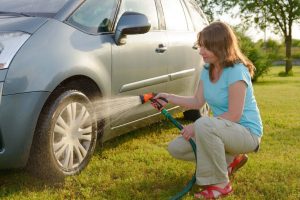
Residential water usage is also a key factor in water conservation. The biggest residential outdoor water guzzlers are summer activities such as lawn and garden watering, car washing, and water-based recreation, while the biggest water indoor guzzlers are, in order, toilets, washing machines, showers, sinks, and leaks. One of the keys to successful conservation is to stop thinking about limiting water usage as “going without” and to start thinking about it as doing the same — or more — but with less. Challenging ourselves to accomplish our water-based tasks with less usage will naturally lead to a more water and cost efficient household. The best part is that conservation doesn’t just ease our wallets, but also provides endless benefit to the environment and our community.
Lawns
When seeding a lawn, select a turf mix that matches your site conditions and climate, and improve the health of your lawn by regularly aerating, dethatching, and adding compost. Mow lawns to the highest mower setting so that the roots are shaded and help the soil to retain more moisture. And speaking of water, water deeply but infrequently, and only in the early morning to avoid evaporation. This will encourage drought resistance and deep, healthy plant roots.
Gardens
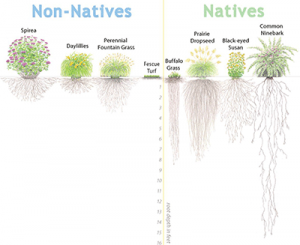
Choose native, drought-resistant plants and group plants with the same watering needs together, preventing over- or under-watering as well as minimizing the need for supplemental watering. Also, mulch around plants to help the soil retain moisture and to reduce evaporation. Finally, think about installing a rain barrel to be used to water non-edible plants.
Maintenance and Recreation
Clean walkways and driveways with a broom, not the hose, and inspect all outdoor water fixtures for leaks. Check pools and spas for leaks, regularly service pumps, and cover them when not in use to reduce evaporation. Finally, don’t leave the hose running when washing vehicles, or better yet, drive through a car wash. Commercial car washes use less water than washing the car at home, and are legally required to manage their gray water runoff to avoid pollution.
Indoors
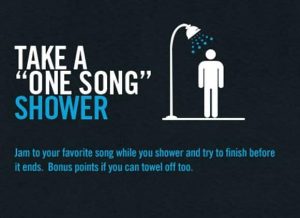 Install water efficient toilets that use only 1.6 gallons per flush, and regularly check toilets for leaks. Leaky toilets are most often fixable by simply installing a new flapper. Try taking shorter showers and install water efficient showerheads. Only run the laundry or dishwasher when completely full, and consider replacing older models with newer, more water efficient ones. Repair leaking faucets and install water efficient faucet aerators to reduce water usage, and wash fruits and vegetables in a pan of water rather than running the faucet. Bonus: use the spent wash water to water house plants.
Install water efficient toilets that use only 1.6 gallons per flush, and regularly check toilets for leaks. Leaky toilets are most often fixable by simply installing a new flapper. Try taking shorter showers and install water efficient showerheads. Only run the laundry or dishwasher when completely full, and consider replacing older models with newer, more water efficient ones. Repair leaking faucets and install water efficient faucet aerators to reduce water usage, and wash fruits and vegetables in a pan of water rather than running the faucet. Bonus: use the spent wash water to water house plants.
In Conclusion
 Summertime is a time for family and fun, and water restrictions shouldn’t put a damper on summer activities. Conscientious residential water usage combined with consistent, well-implemented municipal water audits results in a more cost-effective and environmentally friendly water system. Water conservation and efficiency benefits both consumers and municipalities, and provides a more sustainable water system for future generations.
Summertime is a time for family and fun, and water restrictions shouldn’t put a damper on summer activities. Conscientious residential water usage combined with consistent, well-implemented municipal water audits results in a more cost-effective and environmentally friendly water system. Water conservation and efficiency benefits both consumers and municipalities, and provides a more sustainable water system for future generations.
